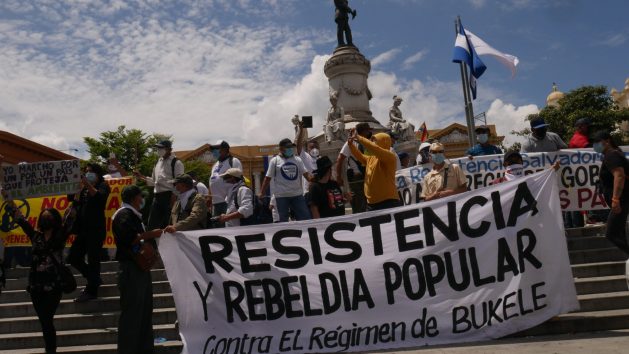Bukele Speeds Up Moves Towards Authoritarianism in El Salvador

SAN SALVADOR, Sep 17 (IPS) - The president of El Salvador, Nayib Bukele, has been widely criticised for his authoritarian tendencies, but has said that the changes he plans will be long-term - which to his critics means a further undercutting of the weak democratic institutions that he has already begun to dismantle.
The president gave the commemoration of the bicentennial of Central America's independence on Wednesday, Sept. 15, a symbolic touch and pledged that his government would not reverse the changes put into motion.
"This country has suffered so much that it cannot be transformed overnight; important changes, real and worthwhile changes, take time, they are not immediate, they are made step by step", said Bukele, in a nationwide address broadcast on radio and television on Wednesday night.
The opposition, however, sees the changes as an attack on democracy in this Central American nation of 6.7 million people.
Bukele for president in 2024?
Perhaps the most abrupt change pushed through by the Bukele administration since it took office in June 2019 was the removal of the five judges in the Supreme Court's constitutional chamber.
They were removed on May 1 when the new legislature, controlled by the lawmakers of Nuevas Ideas, Bukele's party - who now hold 56 of the 84 seats - was installed.
The governing party's majority allowed the president to appoint like-minded judges to the constitutional chamber, whose first move was to strike down the legal obstacle to consecutive presidential reelection.
That opened the door for the president to run again at the end of his current five-year term, in 2024, which was prohibited by the constitution until just two weeks ago.
Bukele, a 40-year-old of Palestinian descent from a wealthy business family, first emerged in politics as a popular mayor of San Salvador from 2015 to 2018. He is described by observers as a millennial populist who uses social media to communicate with the public, often announcing his decisions via Twitter.
The constitutional chamber ruled that the country's president can serve two consecutive terms in office, whereas according to a 2014 ruling by the same court a president could only run for office again after two terms served by other leaders, based on an interpretation of article 152 of the constitution.
But the new constitutional court judges named by the legislature on May 1 reinterpreted this controversial and confusing article of the constitution and ruled on Sept. 3 that presidents can stand for a consecutive term if they step down six months before the election.
The legal ruling, which drew fire from the opposition and global rights watchdogs, thus makes it possible for Bukele to seek a second term in 2024.

Manual for Latin American authoritarianism
The Salvadoran president is apparently following, virtually letter by letter, the manual used by other Latin American populist presidents with an authoritarian bent, whether on the right or the left, who, by means of rulings handed down by judges under their control, have overturned laws and perpetuated themselves in power.
"If the people grant power, and the people demand these changes, it would be no less than a betrayal not to make them," the president said in his speech before civilian and military leaders.
The president now controls the three branches of government, with no checks against his style of government where everything revolves around him, a millennial who usually wears a backwards baseball cap and is intolerant of criticism, whether from the media, international organisations, the U.S. government or other countries.
On the morning of Wednesday Sept. 15, thousands of people marched through the streets of the Salvadoran capital to protest the president's increasing authoritarianism, in the most massive demonstration against Bukele since he came to power.
"I'm marching to defend our rights and to protest against President Bukele's abuses," a trans woman who preferred to remain anonymous told IPS.
Bukele won a landslide victory in February 2019 as an anti-establishment candidate riding the wave of voter frustration and disappointment with the right-wing Nationalist Republican Alliance (ARENA), in power from 1989 to 2009, and the left-wing Farabundo Martí National Liberation Front (FMLN), which governed from 2009 to 2019.

His party then swept the legislative elections in May 2021 and now, having replaced the members of the constitutional court, Bukele pulls the strings of an important segment of the country's justice system.
He also controls the Attorney General's Office, after the governing party's legislative majority removed then Attorney General Raúl Melara on May 1, replacing him with the pro-Bukele Rodolfo Delgado.
"Apparently we are in democracy, but the president's actions run counter to democracy, he is dismantling the state's institutionality, and is thus attacking the rights of the entire population," lawyer Loyda Robles, of the Foundation for Studies for the Application of Law (FESPAD), told IPS.
She added that there were warning signs that El Salvador could be heading towards an even more authoritarian, dictatorial, Nicaragua-style regime.
The president of that country, Daniel Ortega, has already served three consecutive terms since his return to power in 2007, and is heading for a fourth term in 2022. To this end, the judiciary, under his control, has imprisoned almost a dozen opposition candidates who could challenge him at the polls.
Slippery slope of anti-democratic measures
Emboldened by his overwhelming triumph in the 2019 presidential elections, Bukele has taken a series of steps that have angered opposition sectors, because they believe that he intends to undermine all checks and balances and govern at will.
In addition to the removal of the constitutional court judges and the attorney general, the legislature passed a decree on Aug. 31 that forced some 200 judges to retire.
The government claims it is purging corrupt judges, who do exist. However, the process has not been based on investigations but on an across-the-board decision to make retirement mandatory for all judges over the age of 60 or who have worked for 30 years.
Some analysts have interpreted the move as a purge within the judicial system in order to later fill the vacuum with judges aligned with Bukelismo.
The government denies this charge and says the aim is to make way for young lawyers, arguing that judges in El Salvador do not hold lifetime positions.
But all of these moves have set off alarm bells both inside and outside El Salvador.

However, analyst Dagoberto Gutiérrez told IPS that the struggle between Bukele and his opponents is rooted in a silent struggle between two economic groups: the traditional oligarchy that has pulled the strings of the country's politics, and new small, medium and even large businesspeople aligned with the president.
Gutiérrez, a former guerrilla commander now close to the president, said the opposition is demanding independence of powers that has actually never existed in the country, since the oligarchy always put in place officials who would maintain the status quo.
That "democracy" touted by the oligarchy, with its fallacies and abuses, is being taken up by another political project, that of Bukele, who stressed that the extent of the transformations he has planned "is yet to be seen."
For the time being, according to the constitutional court's recent ruling, Bukele can, if he wishes, seek reelection at the end of his current term. But he would not be able to run for a third consecutive term.
However, lawyer Tahnya Pastor remarked to IPS: "Who can assure us that in the future, by means of another legal precedent, they won't pull another reelection out of their sleeve? This doubt remains, obviously."
She added that when all the warning signs are analysed, "we can conclude that we are heading towards the ultimate concentration of power, and history has shown that no concentration of power is good."
But like Gutiérrez, Pastor criticised the opposition because in the past they have also manipulated, for their own political interests, the same institutions over which they are now crying foul.
"The constitution has indeed been reformed in the past depending on the makeup of the constitutional court, and the jurisprudence has responded to partisan political interests," she said.
Bukele seems to be confident that, despite the criticism, his policies and vision are welcomed by the majority of Salvadorans, who continue to support him.
According to a survey by the José Simeón Caña Central American University carried out in June, during Bukele's second year in office, nine out of 10 respondents said the president represented a positive change for the country.
He obtained an overall high score of 8.1, and those surveyed identified the government's good management of the Covid-19 pandemic as its main achievement.
Not everyone shares this enthusiasm for Bukele, obviously, nor does all the criticism come from academic, political or activist circles.
"It's not good for someone to govern as he pleases, that's how things were done when there were kings, but we are no longer in those times," Hernán Campos, a farmer from the Cangrejera canton in the municipality and department of La Libertad, in the central part of the country, told IPS.
© Inter Press Service (2021) — All Rights Reserved. Original source: Inter Press Service
 Global Issues
Global Issues